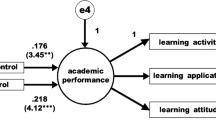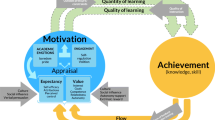Abstract
The COVID-19 pandemic kick-started a new paradigm shift in the way and manner teaching and learning takes place on the global scale due to the lockdown that succeeded in shutting down school activities. As a result, most institutions turned to technology supported e-learning as against the traditional face-to-face teaching and learning in order to cover for lost time. This study therefore tested the effectiveness of game-based learning on students’ performance in educational technology. Using a simple repeated measures design, 24 students participated in this study. Using an Educational Technology Achievement Test (ETAT), which was validated and pilot-tested to obtain data, the students were given two separate pre-tests before the commencement of the treatment as well as two different post-tests after the treatment. Data were computed using a mixed design repeated-measures ANOVA. Findings revealed that game-based learning significantly improved students’ performance to a large extent (F (3, 69) = 170.960; p < 0.05) with an effect size (ηp2) of 0.881. The study has some implications for Nigerian teachers and researchers in Educational Technology and Science-related fields on the need to incorporate game-based learning given that it has what it takes to improve students’ performance.
Similar content being viewed by others
Data availability
The data is available upon request because participants were assured of their confidentiality.
References
Bayeck, R. Y. (2020). Examining board gameplay and learning: A multidisciplinary review of recent research. Simulation & Gaming, 51(4), 411–431. https://doi.org/10.1177/1046878119901286.
Chang, M. M., & Lan, S. W. (2021). Flipping an EFL classroom with the LINE application: Students’ performance and perceptions. Journal of Computers in Education, 0123456789. https://doi.org/10.1007/s40692-020-00179-0.
Chang, C. Y., Kao, C. H., Hwang, G. J., & Lin, F. H. (2020). From experiencing to critical thinking: A contextual game-based learning approach to improving nursing students’ performance in electrocardiogram training. Educational Technology Research and Development, 68(3), 1225–1245. https://doi.org/10.1007/s11423-019-09723-x.
Chen, C. H., Liu, J. H., & Shou, W. C. (2018). How competition in a game-based Science Learning Environment influences Students’ learning achievement, Flow Experience, and learning behavioral patterns. Journal of Educational Technology & Society, 21(2), 164–176. https://www.jstor.org/stable/26388392.
Cohen, J. (1988). Statistical power analysis for the behavioral sciences. Lawrence Erlbaum Associates.
Deterding, S., Dixon, D., Khalid, R., & Nacke, L. (2011). From game design elements to gamefulness: Defining Gamification. In 15th International Academic MindTrek Conference: Envisioning Future Media Environments (pp. 9–15) New York, NY: ACM. https://doi.org/10.1145.2181037.2181040.
Falode, O. C., & Mohammed, I. A. (2023). Improving students’ geography achievement using computer simulation and animation packages in flipped classroom settings. Journal of Digital Educational Technology, 3(1), ep2303. https://doi.org/10.30935/jdet/13106.
Hung, C. M., Huang, I., & Hwang, G. J. (2014). Effects of digital game-based learning on students’ self-efficacy, motivation, anxiety, and achievements in learning mathematics. Computers in Education, 1(2–3), 151–166. https://doi.org/10.1007/s40692-014-0008-8.
Jones, B., & Kenward, M. G. (2003). Design and analysis of cross-over trials (2nd ed.).). Chapman and Hall.
Kiliç, I., & Gürbüz, O. (2022). The effect of educational game activities applied on the academic achievement of secondary students in science education. African Educational Research Journal, 10(3), 242–249. https://doi.org/10.30918/AERJ.103.22.038.
Mao, W., Cui, Y., & Lee, H. (2022). Effect of game-based learning on students’ critical thinking: A meta-analysis. Journal of Educational Computing Research, 59(8). https://doi.org/10.1177/07356331211007098.
Mohammed, I. A., & Ogar, S. I. (2023). Exploring the potential of YouTube videos towards enhancing achievement and retention of undergraduate students in environmental education. European Journal of Interactive Multimedia and Education, 4(1), e02302. https://doi.org/10.30935/ejimed/13190.
Mohammed, I. A., Kuta, I. I., & Bello, A. (2023). Gender difference in undergraduates’ micro-teaching performance using Telegram and WhatsApp platforms in collaborative learning settings. Mediterranean Journal of Social & Behavioral Research, 7(1), 1–8. https://doi.org/10.30935/mjosbr/13665.
Parra-González, M. E., & Segura-Robles, A. (2019). Scientific production on gamification in education: A scientometric analysis. Revista De Education, 5, 113–131. https://doi.org/10.15293/2658-6762.1903.13.
Riopel, M., Nenciovici, L., Potvin, P., Chastenay, P., Patrick, C., Sarrasin, J. B., & Masson, S. (2019). Impact of serious games on science learning achievement compared with more conventional instruction: An overview and a meta-analysis. Studies in Science Education, 55(2), 169–214. https://doi.org/10.1080/03057267.2019.1722420.
Schmid, M., Brianza, E., & Petko, D. (2021). Self-reported technological pedagogical content knowledge (TPACK) of pre-service teachers in relation to digital technology use in lesson plans. Computers in Human Behavior, 115, 106586. https://doi.org/10.1016/j.chb.2020.106586.
Shiue, Y. M., & Hsu, Y. C. (2017). Understanding factors that affecting continuance usage intention of game-based learning in the context of collaborative learning. Eurasia Journal of Mathematics Science and Technology Education, 13(10), 6445–6455. https://doi.org/10.12973/ejmste/77949.
Sykes, J. M., & Dubreil, S. (2019). Pragmatics Learning in Digital games and virtual environments. In N. Taguchi (Ed.), The Routledge Handbook of Second Language Acquisition and Pragmatics. Routledge. https://doi.org/10.4324/9781351164085-25.
Tokac, U., Novak, E., & Thompson, C. G. (2019). Effects of game-based learning on students’ mathematics achievement: A meta-analysis. Journal of Computer Assisted Learning, 35(3), 407–420. https://doi.org/10.1111/jcal.12347.
Tsai, Y. L., & Tsai, C. C. (2020). A meta-analysis of research on digital game-based science learning. Journal of Computer Assisted Learning, 36(3), 280–294. https://doi.org/10.1111/jcal.12430.
Ugwuanyi, C. S. (2022). Developing sound knowledge of Basic Science concepts in Children using flipped Classroom: A case of simple repeated measures. Education and Information Technologies, 27, 6353–6365. https://doi.org/10.1007/s10639-021-10850-3.
Umboh, D., Tarusu, D., Marini, A., & Sumantri, M. S. (2021). Improvement of student mathematics learning outcomes through Kahoot learning games application at elementary school. Journal of Physics: Conference Series, 1869 (1), 1–6. https://doi.org/10.1088/1742-6596/1869/1/012124.
Wang, L. H., Chen, B., Hwang, G. J., Guan, J. Q., & Wang, Y. Q. (2022). Effects of digital game-based STEM education on students’ learning achievement: A meta-analysis. International Journal of STEM Education, 9, 26. https://doi.org/10.1186/s40594-022-00344-0.
Yadev, A. K., & Oyelere, S. S. (2021). Contextualized mobile game-based learning application for computing education. Education and Information Technology, 26, 2539–2562. https://doi.org/10.1007/s10639-020-10373-3.
Acknowledgements
The researchers are grateful to the students for their participation.
Funding
There is no funding for this study.
Author information
Authors and Affiliations
Contributions
Ibrahim Abba Mohammed wrote the first draft. Oluwole Caleb Falode reviewed the draft and checked literature. Ibrahim Ismaila Kuta made revisions in methodology. Ahmed Bello reviewed the draft to check technical quality.
Corresponding author
Ethics declarations
Ethical approval
The ethical and research committee of Federal University of Technology Minna, Niger State, Nigeria, gave an approval for the study.
Competing interests
Authors declare no competing interest.
Additional information
Publisher’s Note
Springer Nature remains neutral with regard to jurisdictional claims in published maps and institutional affiliations.
Rights and permissions
Springer Nature or its licensor (e.g. a society or other partner) holds exclusive rights to this article under a publishing agreement with the author(s) or other rightsholder(s); author self-archiving of the accepted manuscript version of this article is solely governed by the terms of such publishing agreement and applicable law.
About this article
Cite this article
Mohammed, I.A., Falode, O.C., Kuta, I.I. et al. Effect of game-based learning on educational technology Students’ performance: A case of simple repeated measures approach. Educ Inf Technol (2024). https://doi.org/10.1007/s10639-024-12593-3
Received:
Accepted:
Published:
DOI: https://doi.org/10.1007/s10639-024-12593-3




